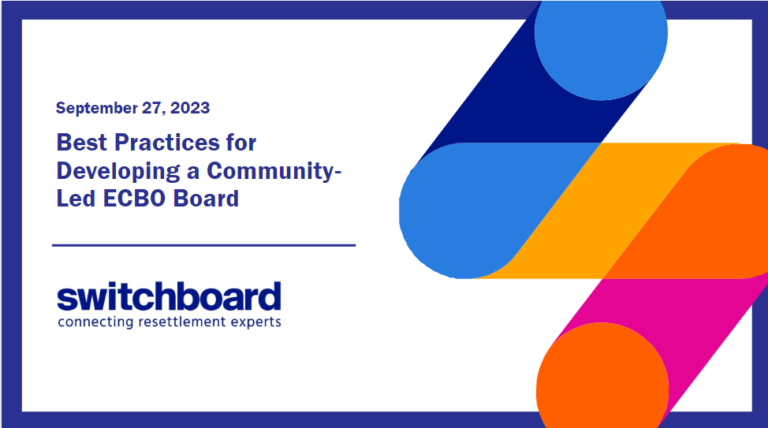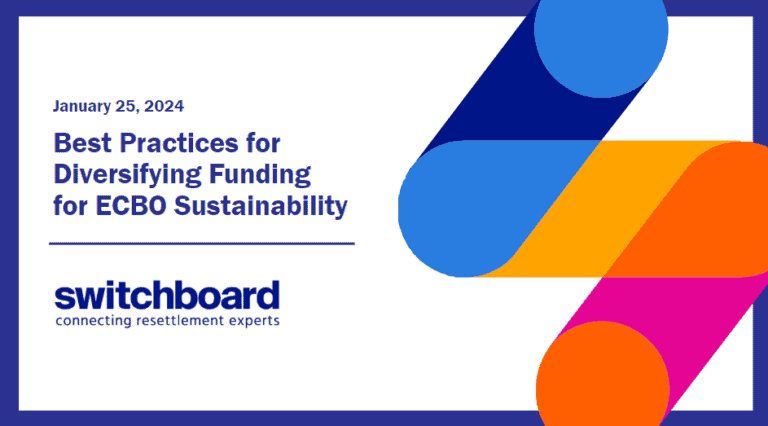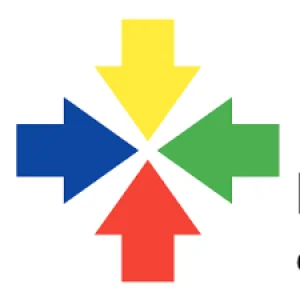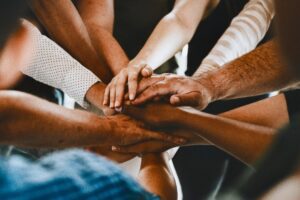Supporting a community demands a robust support structure. Leaders of ethnic community-based organizations (ECBOs) particularly understand this. As defined by the Office of Refugee Resettlement (ORR), an ECBO is a nonprofit primarily formed by present or past refugees to champion refugee progress. Having a community-led ECBO board can go a long way in meeting a community’s needs. Leaders who come from a shared background know and understand what’s important to fellow community members. However, sustaining a community-led board has its challenges, which is why we spoke with other ECBO leaders to discuss best practices for developing and maintaining a successful community-led board.
Responsibilities of a Community-Led Board
Traditional Governance Responsibilities
Community-led boards have the same basic responsibilities as all nonprofit boards—they are responsible for ensuring that the organization has what it needs to carry out its mission, and that it does so legally, ethically, and effectively.
These fundamental governance responsibilities that all board members have a duty to undertake include the following:
- Creating organizational policies, such as conflict of interest, fiscal, and personnel policies
- Setting direction through active participation in strategic planning
- Providing oversight of the organization’s finances, including approving budgets and financial reports
- Helping raise funding and other resources essential to carrying out the organization’s mission, including financial support for the organization or assisting in the procurement of needed resources for the community
- Supporting and evaluating the executive director of the organization
Community-led boards bring many strengths to these core governance functions. Community members have lived experience, which is invaluable when it comes to making decisions to better the lives of the people served by the ECBO. For example, when identifying community needs and aspirations to set direction, community-led boards already have much of this information through their lived experience and typically have deep relationships with community members and leaders who can provide more input. Members of community-led boards also come into board service with a high level of commitment to the mission because that mission is so deeply personal to them, their families, and their communities.
Additional Community Responsibilities
In addition to traditional governance responsibilities, community-led boards typically take on extra roles because of their close connection to the community being served—they are, in fact, members of the community themselves. They are especially effective ambassadors for the organization and play a critical role in community outreach, needs assessment, and building trust with the community. Because of what they bring and the important roles they take on, community-led boards can significantly contribute to the long-term sustainability of an ECBO. However, as we heard from ECBO leaders, there are challenges to developing effective community-led boards. Fortunately, these leaders are also discovering promising practices to address these challenges.
Tip: Avoiding Burnout
Board burnout is a common phenomenon, especially when board members take on additional responsibilities. ECBO leaders can reduce board burnout by expressing gratitude with retreats and community appreciation events. Conference trips and professional development opportunities can also help community board members feel appreciated and supported.
What We Heard from ECBO Leaders: Addressing Common Challenges
Though many of the ECBO leaders we spoke with came from different backgrounds, there were common challenges they faced in efforts to build effective community-led boards. Below are practices that have helped address these common challenges in building and supporting community-led boards.
Communication and Culturally-Appropriate Training for Capacity Building
While some community members have organizational or project management experience from their countries of origin or refugee camps, few are familiar with U.S. nonprofit systems. Others may have strong leadership abilities but, due to factors like civil wars that disrupted their formal education, lack the requisite English proficiency, financial capacity, or nonprofit management skills essential to sustaining organizations in the U.S. ECBO leaders also identified a lack of accessible, culturally and linguistically appropriate training that can provide community board members with an understanding of nonprofit board responsibilities and practices in the U.S. context.
One strategy for addressing these challenges is to set up consistent communication between board members and the executive director and other staff. This can contribute greatly to a community-led board’s success. Regular communication minimizes the chances of misunderstandings and allows the board to work more efficiently as a team. One helpful practice is to schedule prep meetings for community board members before scheduled board meetings to make sure that they truly understand the meeting agenda, financial documents, and especially any agenda items to vote on. This additional step is critical to make sure they truly understand what they are voting on and feel confident in their votes.
It is also crucial that refugee and former refugee board members are given additional opportunities for professional development. Some ECBO leaders are working with universities and local foundations to provide board members with quality trainings and professional development resources. Local foundations sometimes have capacity-building and general operation support funding, which can be used to pay for tailored board and staff training, strategic planning, succession planning, and even staff and board retreats.
Training and Professional Development Resources
Resettlement Learning Opportunities
Switchboard offers free self-paced e-learning and instructor-led certificate courses, as well as personalized technical assistance, to help refugee service providers develop skills in areas like supervision, monitoring and evaluation, data analysis, affordable housing, and more.
General Nonprofit Resources
The National Council of Nonprofits offers a wide variety of resources to help nonprofit organizations in areas such as administration, financial management, human resources, ethics, fundraising, governance, leadership, starting a nonprofit, marketing, communications, and more.
Free University Courses
Harvard University is one of several universities and colleges that offer free training for leaders and staff who work for nonprofit organizations. Some of its free offerings include the Nonprofit Financial Stewardship Webinar: Introduction to Accounting and Financial Statements and the New Ideas for Nonprofit Leaders Webinar.
Low-Cost Nonprofit Management Certificates
Several universities, like Duke and Drexel, offer low-cost certificate courses in nonprofit management that focus on grant writing, board development, and more.
Merging Cultural Values and Local Expertise
Some ECBO leaders identified a need for flexibility with traditional board structures, responsibilities, and standards when building a community-led board. The challenge these leaders identified was around how to ensure their board continues to be in compliance with state and federal (IRS) regulations, while still respecting cultural values and approaches. Boards have to contend with making decisions that both reflect their cultural values and are legally sound.
This is where relying on local expertise can be beneficial, especially if these contributions are considered a part of the cultural diversity inherent to the organization. Additionally, it can be helpful for ECBOs to reach out to other local organizations or organizations with similar missions for guidance in navigating shared struggles.
In Switchboard’s monthly community of practice (CoP) meeting for ECBO leaders from across the country, participants voice concerns about issues affecting them, and others offer strategies that have worked for them. Many refugee-serving organizations have found value in connecting with professionals outside their communities who can contribute knowledge and skills. Some start with boards comprised of community members then gradually add outside experts to achieve a balance of lived experience and professional expertise.
Having non-community members also allows for an outside perspective, which can be helpful in bringing in ideas that otherwise may not have been thought of or considered. For example, unlike traditional boards that quickly tap into established networks for fundraising, community-led boards often require additional time and training to forge these connections. ECBOs, especially newer ones, grapple with the daunting task of securing unrestricted funding crucial for staff, board development, and strategic planning. Without this foundational support, many struggle to establish and fulfill their core mission.
For ECBOs working with multiple different ethnic groups, having a diverse board with representatives that reflect the communities being served can help create a more inclusive and welcoming organization.
Conclusion
Building an effective community-led board requires hard work and resources, including culturally and linguistically appropriate training and unrestricted funding for capacity building and strategic planning for the organization. Even so, it is well worth the effort, because building community-led board capacity builds your community’s capacity over the long term.










